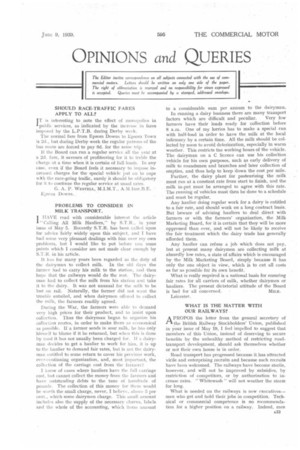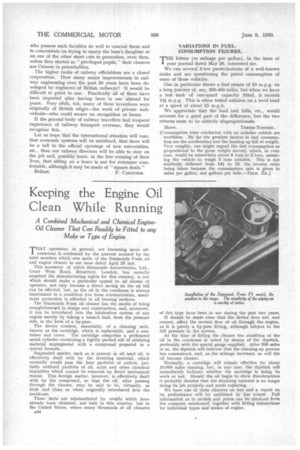OPINIONS and QUERIES
Page 51

Page 52

If you've noticed an error in this article please click here to report it so we can fix it.
The Editor invites correspondence on all subjects connected with the use of com mercial motors. Letters should he written on only one side of the paper. The right of abbreviation is reserved and no responsibility for views expressed
is accepted. Queries must be accompanied by a stamped, addressed enoeiope.
SHOULD RACE-TRAFFIC FARES APPLY TO ALL?
IT is interesting to note the effect of monopolies in -"public services, as indicated by the increase in fares imposed by the L.P.T.B. during Derby week.
The normal fare from Epsom Downs to Epsom Town iS 2d., but during Derby-week the regular patrons of the bus route are forced to pay Gd. for the same trip.
If the Board can run a regular service all the year at a 2d. fare, it savours of profiteering for it to treble the charge at a time when it is certain of full loads. In any case, even if the Board .feels it necessary to impose increased charges for the special vehicle put on to cope w-*h the race-going traffic, surely it should be obligatory for it to continue the regular service at usual rates.
G. A. P. WESTELL, .A.M.Inst.B.E. ' Epsom Downs..
PROBLEMS TO CONSIDER IN . MILK TRANSPORT.
HAVE read with considerable interest the article " Calling All Milk Hauliers," by S.T.R., in your issue of May 5. Recently S.T.R. has been called upon for advice fairly widely upon this subject, and I have had some very pleasant dealings with him over my own problems, but I would like to put before you some points which I consider are not made clear enough by S.T.R. in his article.
It has for many years been regarded as the duty of the dairyman to collect milk. In the old days the farmer had to carry his milk to the station, and then hope that the railways would do the rest. The dairyman had to collect the milk from his station and take it to the dairy. It was not unusual for the milk to be lost on rail. Naturally, the farmer did not want the trouble entailed, and when dairymen offered to collect the milk, the farmers readily agreed.
During the War, the farmers were able to demand very high prices for their product, and to insist upon collection. Thus the dairyman began to organize his collection routes, in order to make them as economical as possible. If a :farmer sends in sour milk, he has only himself to blame if it be returned, but when this is done by road it has not usually been charged for. If a dairyman decides to get a haulier to work for him, it is up to the haulier to demand fair rates, but is not the dairyman entitled to some return to cover his previous work, ever-continuing organization, and, most important, the collection of the carriage cost from the farmers'?
I know of cases where hauliers have the full carriage cost, but cannot collect the money from the farmers and have outstanding debts to the tune of hundreds of pounds. The collection of this money for them would he worth the small charge, never, I believe, above 5 per cent., which some dairymen charge. This small amount includes also the supply of -the necessary churns, labels and the whole of the accounting, which items amount to a considerable sum per annum to the dairyman. In running a dairy business there are many transport factors which are difficult and peculiar. Very few farmers have their loads ready for collection before 8 a.m. One of my lorries has to make a special run with half-load in order to have the milk at the local infirmary by a certain time. All the milk should be collected by noon to avoid deterioration, especially in warm weather. This restricts the working hours of the vehicle. The dairyman on a C licence can use his collection vehicle for his own purposes, such as early delivery of milk to roundsmen and branches and later collection of empties, and thus help to keep down the cost per mile.
Further, the dairy plant for pasteurizing the milk must run at a constant rate from start to finish, and the milk in-put must be arranged to agree with this rate. The running of vehicles must then be done to a schedule and must be regular.
Any haulier doing regular work for a dairy is entitled to a fair rate, and should work on a long contract basis. But beware of advising hauliers to deal direct with farmers or with the farmers' organization, the Milk Marketing Board, for it is certain that they will be more oppressed than ever, and will not be likely to receive the fair treatment which the dairy trade has generally afforded them.
Any haulier can refuse a job which does not pay, but at present many dairymen are collecting milk at absurdly low rates, a state of affairs which is encouraged by the Milk Marketing Board, simply because it has only the one object in view, which is to cut all costs as far as possible for its own benefit.
What is really required is a national basis for ensuring fair rates for all carriers of milk, whether dairymen or hauliers. The present dictatorial attitude of the Board is bad for all concerned. • MILK. Leicester.
WHAT IS THE MATTER WITH OUR RAILWAYS?
APROPOS the letter from the general secretary of the British Railway Stockholders' Union, published in your issue of May 19, I feel impelled to suggest that members of this Union, instead of deserving to secure benefits by the unhealthy method of restricting roadtransport development, should ask themselves whether or not their own house is in order.
Road transport has progressed because it has attracted virile and enterprising recruits and because such recruits have been welcomed. The railways have become sterile, however, and will not be improved by subsidies, by restriction of competitors, or by authorization to increase rates. " Whitewash " will not weather the storm for long.
What is needed on the railways is new executives— men who get and hold their jobs in competition. Technical or commercial competence is no recommendation for a higher position on a railway. indeed, men who possess such faculties do well to conceal them and to concentrate on trying to marry the boss's daughter or on one of the other short cuts to promotion, even then, unless they started as " privileged pupils," their chances are Chinese in potentialities.
The higher ranks of railway officialdom are a closed corporation. How many major improvements in railway engineering over the past 50 years have been developed by engineers of British railways? It would be difficult to point to one. Practically all of them have been imported after having been in use abroad for years. Very often, too, many of these inventions were originally of British origin—the work of private individuals—who could secure no recognition at home.
If the general body of railway travellers had frequent experience of railway transport overseas, they woukl recognize this.
Let us hope that the international situation will ease, that economic systems will be stabilized, that there will be a lull in the official openings of new universities, etc., then our railway directors will be able to stay on the job and, possibly learn, in the late evening of their lives, that sitting on a fence is not for evermore comfortable, although it may be made of "square deals." Belfast. F. CARTNESS. VARIATIONS IN FUELCONSUMPTION FIGURES.
letters (re mileage per gallon), in the issue of TlyTur journal dated May 26, interested me.
We run several 3-ton pantechnicons of a well-known make and are questioning the petrol consumption of some of these vehicles.
One in particular shows a fuel return of 10 m.p.g. on a long journey of, say, 300-400 miles, but when we have a test tank of one-quart capacity fitted, it records 144 m.p.g. This is when tested unladen on a level road at a speed of about 25 m.p.h.
We appreciate that the load 'and hills, etc., would account for a good part of the difference, but the two returns seem to be entirely disproportionate.
Hove. THREE-TONNER.
[Consumption tests conducted with an unladen vehicle are worthless. By far the greatest factors in fuel consumption are the accelerating and the hauling up hill of weight. Very roughly, one might regard the fuel consumption as proportional to the gross weight moved, which, in your case, would be somewhere about 6 tons to 3 tons, assuming the vehicle to weigh 3 tons unladen. This is not markedly different from 144 to 10, the inverse ratio being taken because the consumption rate is given in miles per gallon, not gallons per mile.—TEcn. En.]




















































































